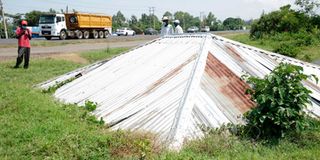The duty of finding justice is meant for the living and not the departed

A roof is seen at Tieng’rea, on the Kisumu-Busia highway, Kisumu County, on June 11. The family house was demolished after the body of the father, who had died eight years before, was exhumed over a land dispute.
What you need to know:
- We are a country with such a taboo and aversion about death that we do not even have a substantive law or policy on it.
- Talking about, preparing for or even legislating death is inviting it, we hold in superstitious fear.
The following were famously said about death. First, if you were born, the two things you will never elude are taxes and death. Second, that if you were born of a woman, you will certainly die. Third, there are very few ways to die — accident, illness, old age, suicide or murder. Lastly, nobody is getting out of this world alive.
We are a country with such a taboo and aversion about death that we do not even have a substantive law or policy on it. Talking about, preparing for or even legislating death is inviting it, we hold in superstitious fear.
As a result, we subjectively defer to cultural norms and case law — which often results in expensive and painful litigation that is exploitative to families, incompatible with current realities of land tenure and religion and creates public health or security hazards.
A village-mate once cracked me up with laughter when he told me that our funerals are about nyama choma (roast meat). Customary law, since it is uncoded, is simply the opinion of the most influential patriarchs, who advance their parochial interests — often a good meal — not what is fair, right, equitable or just for families and communities.
I have been categorical about the pollution of groundwater by graves, since our cultural burial rites were conceived within a different reality of land tenure and nomadic lifestyles. Our ancestors would bury the dead in the kraal, demolish or burn down the deceased’s home and migrate to escape infectious diseases. They, hence, maintained public health.
Yet we maintain some of these practices, only to end up with multiple generations of graves on top of our groundwater supply and abandoned living spaces since we are ambivalent about demolishing concrete structures.
There are public health concerns over handling the dead — pandemics spread like wildfire because Africans, being Africans, insist on vigils, where they interact with infected bodies. Paradoxically, Covid-19 has put an abrupt stop to our penchant for ‘disco matanga’ and the rest of the celebratory funerals.
With grave robbery a severe problem, desperate families resort to unorthodox means of guarding their departed kin — such as entombment in concrete slabs, which creates an eerie landscape. If the law required burial in cemeteries, securing the dead would be easier and more aesthetic.
Unceremonious looting
Quick burials also hinder access to justice for the dead and the living. In the event of a unresolved suspected murder or apparent suicide, proper preservation of the body or an injunction on burial provide adequate time for DNA sampling that can offer clues.
Then there is the chaos of the process, cost and logistics of moving mortal remains. Unceremonious looting by the living of the dead’s funeral committees. Unhinged conflicts as everybody becomes an expert in customary law but is just advancing personal interest. The funeral becoming a political rally.
I once heard a sentiment directed at those who disappear in the cities and overseas for a lifetime only for their bodies to be sent back to their relatives to bury and ‘live’ with.
Whereas the Constitution asserts equality, our predominantly paternal cultural practices do not confer gender-neutral rights but largely form the body corpus of common, cultural and case law in the absence of a substantive law. Our succession laws are silent on, and in conflict with, our marriage laws with respect to polygamy. The jury is out on who has the primary right to burial or inheritance here: The first, second or fifth wife?
Which woman is a wife? The one he married in church, the common law partner he mostly lived with or the one he has paid dowry for half-way. Or the one he has a child with out of wedlock among them? As a result, we wait anxiously for death and then everything is up for grabs amid disputes.
We need comprehensive laws on the rights, conduct and culture around death, burial and succession.
Let counties create community-level cemeteries to deal with the new realities of settlement, public health and religion and prohibit the archaic cultural practices that have no place in modern society. Secondly, it is wise to have a will. Dignity in death is a human right. It is only fair for the bereaved to have some clarity and closure.
Dr Wangusi is an author, engineer and scientist. [email protected]





